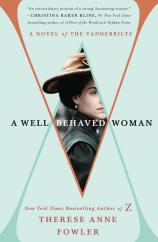Reading Group Guide
Discussion Questions
A Well-Behaved Woman: A Novel of the Vanderbilts

1. How do Alva’s increasingly dire circumstances change once she has married into the Vanderbilt family? Do these changes alter her essential nature or character? Does she stay devout to her sense of ethics or empathy?
2. “Love was a frivolous emotion, certainly no basis for a marriage --- every young lady knew this. You must always put sense over feeling.” (24) Is Alva content with her choice to marry William at his proposal? How does she justify this decision? Does it matter if there is no love in a marriage? Or can love grow in such conditions?
3. What gives Alva her confidence and courage? Is it rooted in her privileged birth and experiences, in continued access to the best life has to offer? How does adversity --- personal and societal --- challenge and invigorate her?
4. Alva and her upper-class contemporaries are seemingly, and not uncommonly, in the dark about the most basic functions of their physical bodies. How have things changed for women in the last century and a half --- and how do we share information about such core experiences as sexuality, pregnancy, childbirth and aging? How has this change in knowledge-sharing, care and education improved our lives? Have cultural attitudes shifted when it comes to perceptions of female sensuality and a wife’s “duty?”
5. How does Alva rebel within her role as societal and charitable maven at the helm of one of America’s most powerful dynasties? As a woman in 1880s New York City, what does she shake up and which principles and duties does she adhere to? Is Alva “the well-behaved woman” of the book’s title? Discuss.
6. What does Oliver Belmont represent to Alva, and does that change over time? Why does Alva initially reject her feelings? Is it all strategic?
7. Why does Alva ignore the gossip about her husband’s infidelities in the course of their marriage? What changes?
8. “‘I’m going to make the most of it, Mary. All of it. I’m going to beat society at its own game.’” (151) Does Alva succeed with this bold assertion? What does the grand house on Fifth Avenue come to symbolize for her at its building (and then well into her marriage)? How does Alva leave her mark on the Vanderbilt name, New York society, and the lives around her? How does she reinvent herself and the literal landscape of the city?
9. “They and their friends existed on a joyous merry-go-round of wealth.” (202) How would you characterize the lives and fancies of the wealthiest families at the turn of the 20th century? How do they spend their days and fortunes? What marks their privilege --- and does this privilege extend beyond their material belongings to their seemingly-no-consequences behavior? Discuss the boating accident scene.
10. “‘My entire life, Consuelo. That’s how long women have been patiently speaking on this subject to one another and to the men in charge --- who take advantage of our habits of being polite and cooperative while censuring every opposite behavior. Men only respect power. So we must be powerful.’” (381) How does this advice resonate with you as a modern reader?
11. “An intelligent woman in this world takes her chances where she finds them.” (170) What are those chances for Alva? What about for you personally?
A Well-Behaved Woman: A Novel of the Vanderbilts
- Publication Date: October 1, 2019
- Genres: Fiction, Historical Fiction, Women's Fiction
- Paperback: 560 pages
- Publisher: St. Martin's Griffin
- ISBN-10: 1250095484
- ISBN-13: 9781250095480







